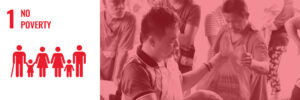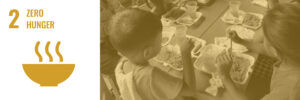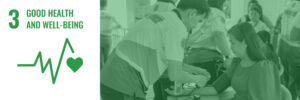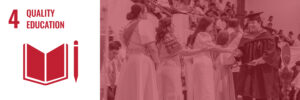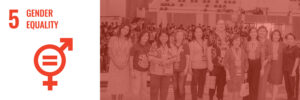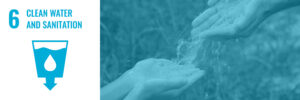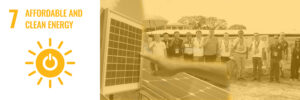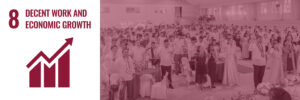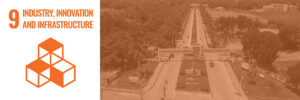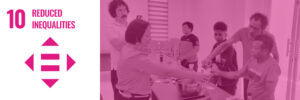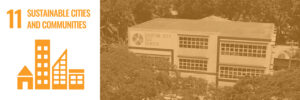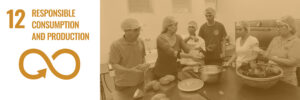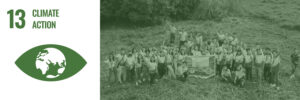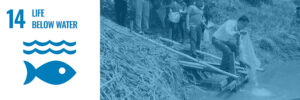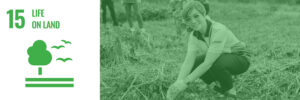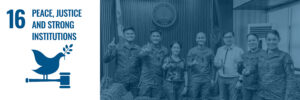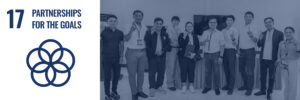2023 – Research | SDG 1 – No Poverty
Technical Research Category
Development of Palleted Biochar as an Organic Amendment for Improved Soil Quality and Productivity
Proponents: Artemio A. Martin, Jr., Batiana M. Mendoza
Abstract
Environmental challenge like global warning prompted the agricultural sector the need in develop carbon-rich materials such as biochar to improve soil fertility and crop productivity. Biochar from the 69:40 mixture of decomposed poultry manure and biowaste materials at– rice hull, corn, cobs, coconut shell, sugarcane bagasse and peanut shell – were produced thru pyrolysis. Biochar is transformed into pellets with corn starch as binder for ease of handling and application Biochar products were alkaline (pH 9.73 :0 10 39). high organic matter (38 77- 52.30 percent), and organ: carbon (22 49 — 78 13 percent). The total nitrogen ranged from 1,94 to 2 62 percent, available phosphorus is 2.88 – 3.75 percent, and potassium is 3.29 – 4.50 percent. NPK of the five (5) biochars is from 8.64 to 9.90, considered as organic. C/N ratio ranged from 11.21 – 11.60 C g-1 N considered narrow, hence preferable and acceptable. The pelleted biochar contains micronutrients with Cu (31.88-44.69 ppm), Zn (141 – 415 ppm), Mn (307 – 358 ppm) and Fe (748 – 1036 ppm). Soil pH significantly improved with biochar application, increased soil organic carbon, nitrogen, phosphorus and potassium contents of soils. Biochar products as organic soil amendment significantly improved yield of rice, corn, eggplant and honeydew, while indicated high potential as nutrient supplement to the recommended rate of inorganic fertilizer in corn, pepper, carrot and radish. Biochar production is a waste management strategy, providing farmers and rural households inexpensive means to tum biomass wastes into quality organic fertilizer (pelleted biochar) to sustain them organic farming activities.
Upscaling of Postharvest Processing and Shelf-Life of Oyster Mushroom (Processing of Mushroom Loaf)
Proponents: Melody E. Lim, Arlene L. Remigio, Ma. Leonila G. Cabbacan
Abstract
This study presents the results of a sensory evaluation conducted to assess the attributes of oyster mushroom gyoza, with participation from 50 evaluators. The gyoza were evaluated based on five sensory attributes: appearance, aroma, texture, taste/flavor, and general acceptability, using a 1-9 hedonic scale where 1 indicates “dislike extremely” and 9 indicates “like extremely.” The results demonstrated that the gyoza had a mean appearance score of 7.6, indicating favorable visual appeal. Aroma received a mean score of 7.2, suggesting general appreciation but less impact on the overall experience. The texture was highly rated with a mean of 7.8, showcasing a successful combination of the soft wrapper and tender filling. The taste/flavor emerged as the standout attribute, achieving a mean score of 8.3, reflecting strong satisfaction attributed to the umami-rich filling of the oyster mushrooms. The overall acceptability score of 8.0 confirmed that the gyoza were well-liked by the evaluators. The findings highlight the strong visual appeal, favorable texture, and particularly satisfying flavor of the oyster mushroom gyoza, establishing them as a successful plant-based alternative to traditional meat-filled dumplings.
Upscaling of Postharvest Processing and Shelf-Life of Oyster Mushroom (Processing of Mushroom Steamed Dumpling)
Proponents: Norvelyn B. Bautista, Ma. Leonila G. Cabaccan
Abstract
This study presents the results of a sensory evaluation conducted to assess the attributes of oyster mushroom gyoza, with participation from 50 evaluators. The gyoza were evaluated based on five sensory attributes: appearance, aroma, texture, taste/flavor, and general acceptability, using a 1-9 hedonic scale where 1 indicates “dislike extremely” and 9 indicates “like extremely.” The results demonstrated that the gyoza had a mean appearance score of 7.6, indicating favorable visual appeal. Aroma received a mean score of 7.2, suggesting general appreciation but less impact on the overall experience. The texture was highly rated with a mean of 7.8, showcasing a successful combination of the soft wrapper and tender filling. The taste/flavor emerged as the standout attribute, achieving a mean score of 8.3, reflecting strong satisfaction attributed to the umami-rich filling of the oyster mushrooms. The overall acceptability score of 8.0 confirmed that the gyoza were well-liked by the evaluators. The findings highlight the strong visual appeal, favorable texture, and particularly satisfying flavor of the oyster mushroom gyoza, establishing them as a successful plant-based alternative to traditional meat-filled dumplings.
Social Research Category
Higher Education Research
Extension
PAGBIYAGAN TI ARUBUBAYAN: PATO-MANOK AT GULAY, MAKA-KABUTENG PANGKABUHAYAN
Proponents: Isaiac C. Dela Peña, Josephine C. Cristobal, Cipriano M. Ticman, Jr.
The “Pato-Manok at Gulay, Maka-Kabuteng Pangkabuhayan (PMGMP)” Program is an integrated agricultural extension and livelihood initiative led by the Institute of Agricultural Technology at Isabela State University-Cauayan Campus. This program is conducted in collaboration with the Province of Isabela Green Ladies Association Inc. (PIGLAI) and the Cauayan City Green Ladies Organization (CCGLO). The PMGMP aims to enhance knowledge, skills, and attitudes (KSA) for the empowerment of farmers and household parents, with a special focus on women’s organizations like the Barangay Green Ladies Organization (BGLO), in addressing poverty and food security. Through seminars, training, and workshops, the program established three main components: poultry, vegetable, and mushroom production. These components serve as training grounds for exploring livelihood practices in the community of Barangay Nagrumbuan, Cauayan City, Isabela, focusing on the production and marketing of ducks, poultry, vegetables, and mushrooms. The PMGMP Program has significantly impacted the local community by providing job opportunities to farmers and members of women’s organizations like the BGLO. Many members have now engaged in mushroom culture and production as a livelihood, funded by PIGLAI. Additionally, some members have started small businesses developing mushroom-based delicacies and products such as mushroom chicharron, sisig, and hot mushroom adobo. Other farmers have ventured into duck and poultry businesses, including broiler production, selling their products locally, and becoming a source of food and income for their families. Barangay Nagrumbuan has been recognized as one of the outstanding barangays in north Cauayan City and has been awarded the “Best Communal Garden” for its integrated vegetable production. Economically, the community has achieved additional income for their families and made technical advancements in their agribusiness ventures.
GENDER AND DEVELOPMENT TOWARD GENDER EQUALITY AND WOMEN EMPOWERMENT (PHASE 1)
Proponents: Ruby B. Dimas, Ph.D., Evelyn B. Cristobal, Ed.D.,Josiefel Agcaoili, Jerahmeel, Elijah B. Ibale
The program of ISU, San Mariano on Gender and development towards Gender Equality and Women Empowerment is aimed to increase the level of knowledge of its women and men particularly the Gawad Kalinga and 4 P’s Recipients in the adopted barangays of Bitabian, San Mariano, Isabela and Sta. Cruz, Benito Soliven, Isabela. It is focused on Gender Sensitivity:GAD Basic Concepts and its related laws; issues and concerns such as LGBT rights, anti-bullying act, VAWC and values education. Livelihood Enterprise Development Training on Baking and Food processing technologies is also included in the training to augment their income employing different strategies as well as human and material resources. The program is anchored in the attainment of Sustainable Development Goals (SDGs) such as SDG 1, alleviation of poverty and SDG 5 gender equality among the beneficiaries and the community as a whole.
GENDER AND DEVELOPMENT TOWARD GENDER EQUALITY AND WOMEN EMPOWERMENT (PHASE 2)
Proponents: Ruby B. Dimas, Aisie B. Liban, Arnie T. Antonio, Evelyn B, Cristobal, Jaypee A. Zipagan
The extension project of ISU, San Mariano on Gender and development towards Gender Equality and Women Empowerment is aimed to increase the level of knowledge of its women and men particularly the Gawad Kalinga and 4 P’s Recipients in the adopted barangays of Bitabian, San Mariano, Isabela and Sta. Cruz, Benito Soliven, Isabela. It is focused on Gender Sensitivity: GAD Basic Concepts and its related laws; issues and concerns such as LGBT rights, anti-bullying act, VAWC, teenage pregnancy and values education.
As per evaluation made after the conduct of the project, there are favorable results such that: the recipients become gender sensitive individuals of the community, reduced cases of teenage pregnancy, the LGBT group are accepted and respected, reduced incidents on violations against women and their children, internalized the needed values in everyday living.
NEGOSYONG PANGKABUHAYAN TUNGO SA KAUNLARAN (NEPANG) PROJECT
Proponents: Josiefel Z. Agcaoili, Evelyn B. Cristobal, Mary Ann Mamauag, Jose Carlos T. Mamauag, Ronderwin A. Vinasoy
The project Negosyong pangkabuhayan Tungo sa Kaunlaran (NEPANG) is an extension project implemented in the two adopted barangays of the campus. It’s a project implemented by the BSHM/BSHRM Core faculty in collaboration with the BSED program. To fully implement the project, the extensionists used various techniques such that coordination with the Barangay Captains were made prior to the conduct or the project. The initial plans of introducing the project among the participants were implemented as well as distribution of IEC materials were given. Then an intensive training was done highlighting key techniques in producing the products. With a collaborative effort from the extensionists and participants, an evaluation of outstanding was rated to us. The project is timely and relevant because it conforms to various Sustainable Development Goals(SDGs) like SDG1 or No Poverty; SDG2 or Zero Hunger and SDG8, Decent Work. The implementation of entrepreneurial activity targeting development of livelihood enterprises among the participants of the adopted barangays were made possible because of the proponents’ enthusiasm to join in the realization of the SDGs or Sustainable Development Goals that the university wish to attain. Therefore, to have a positive economy where numerous job creation enjoys by the people which output benefits the majority, this Negosyong Pangkabuhayan Tungo sa Kaunlaran (NEPANG) is timely and relevant.
PROGRAM/PROJECT TITLE: RESILIENCE-BUILDING AMONG SMALLHOLDER FARMERS OF SELECTED UPLAND FARMING COMMUNITIES IN THE PROVINCE OF ISABELA, PHILIPPINES
The smallholder upland farmers in Isabela, Philippines are one of the most vulnerable sectors to external shocks such as pandemic, climate change and natural calamities, particularly typhoons. As external shocks are inevitable, there is a need to build the resilience of agricultural sector especially in developing nations such as the Philippines particularly the vulnerable farmers in the uplands farming communities in the country through redesigning of their agricultural production systems that are based on the sustainable use of natural resources such as agroforestry system. This proposed capacity development project aims to increase the resilience of vulnerable smallholder farmers in the uplands from critical and pervasive threats of COVID-19 pandemic and natural disasters. There are policy assessments done and proposed specific suggestions for institutionalization of agroforestry in the area. The conduct of multiple trainings such as workshops and training of trainers enhanced and encouraged the farmers to be more engaged with the proposal of the demonstration farms which are now present in certain areas of the upland barangays.
SDG Addressed: SDG 1 – No Poverty; SDG 2 – Zero Hunger; SDG 11- Sustainable Cities and Communities; SDG 13 – Climate Action; SDG 17 – Partnerships for the Goals
6P’s Per Objectives:
This proposed capacity development project aims to increase the resilience of vulnerable smallholder farmers in the uplands from critical and pervasive threats of COVID-19 pandemic and natural disasters. The project specifically aimed to:
- build the knowledge and skills of upland smallholder farmers, farmer organizations, and local government units in the design and establishment of appropriate agroforestry systems in their local communities (People Services, Places and Partnerships) ;
- utilize and strengthen the resources and capacity of local multi-stakeholders respectively, for collaborative resilience-building projects (People Services, Places and Partnerships) ; and
- formulate policy recommendations for institutionalization of adaptive and resilience-building programs (Policies, Publication)
WEED BENEFITS – THE UTILIZATION OF GRASSES, SEDGES, AND BROADLEAVES AS SOURCE OF LIVELIHOOD
Proponents: Eloi Theresa A. Romero, Evelyn B. Cristobal, Jackson Ramos
Grasses, sedges, and broadleaves are considered weeds. These are plants whose undesirable features outweigh their desirable characteristics. They are known as pest in the agricultural fields that interfere with crop growth and development through competition and allelopathy. However, since weeds are plants, they have characteristics that can be beneficial to the ecosystem and to man in daily life including as a source of livelihood. One of the potential livelihoods from the use of weeds is through preserving weeds and using it for letter cards, bookmarks, and other handicrafts such as invitation cards bouquet of dried weeds for weddings, birthdays, valentines’ day, and Christmas gift cards.
Youth at Women and Children Protection Center and Lingap Center were the beneficiaries of these projects by teaching them about weed preservation and used it in making valuable products as a source of income. As feedback, the project served as emotional outlet for the youths from Women and Children Protection Center, skills in arts and craftsmanship were discovered and enhanced, learned that weeds can be a source of income, and the skills taught by the project helped each participant become entrepreneurs while staying in the centers and/or leaving the centers to start a new life.
WINGS OF CHANGE: BOOSTING PRODUCTIVITY THROUGH POULTRY PRODUCTION
Proponent: Lilibeth S. Languido
The Isabela State University San Mariano Campus has been well known in terms of Agricultural production from crops to livestock production since 1978. Poultry production is one of the focusses of the institution since the commodity is considered as one of the quickest productions that gives return/ income and requires less capital and labor. In 2021, the campus is one of the lucky recipients of the Poultry Multiplier Farm worth Five Million (5,000,000.00) under the Bayanihan II program of the Department of Agriculture Regional Field Office 02, which aims to alleviate the effect of the Covid-19 pandemic on the affected constituents (Displaced workers) of the community. The University was given the task to produce quality breeders (Rooster and Hen) and chicks, that were dispersed to qualified recipients for upgrading purposes. A repayment scheme was also implemented in which farmers were obliged to repay 20 chicks one year after the receipt of the animals to ensure the continuity of the project. At present a total of eight hundred ninety-six (896) heads have been dispersed in the municipality of San Mariano, with twenty-nine (29) recipients. Eighteen (18) men, and eleven (11) women were empowered through the series of trainings conducted, an increase in population of the Native chicken by the recipient of Brgy. Dibuluan, San Mariano, Isabela at about 180% based on the data was noted and an additional income amounting to 6,968 pesos was reported by various beneficiaries. The project is also aligned with the Sustainable Development Goals addressing SDG nos. 1,2,3, 4,5,8,10,12,15 and 17, in which impacts on the beneficiaries may be measured.

